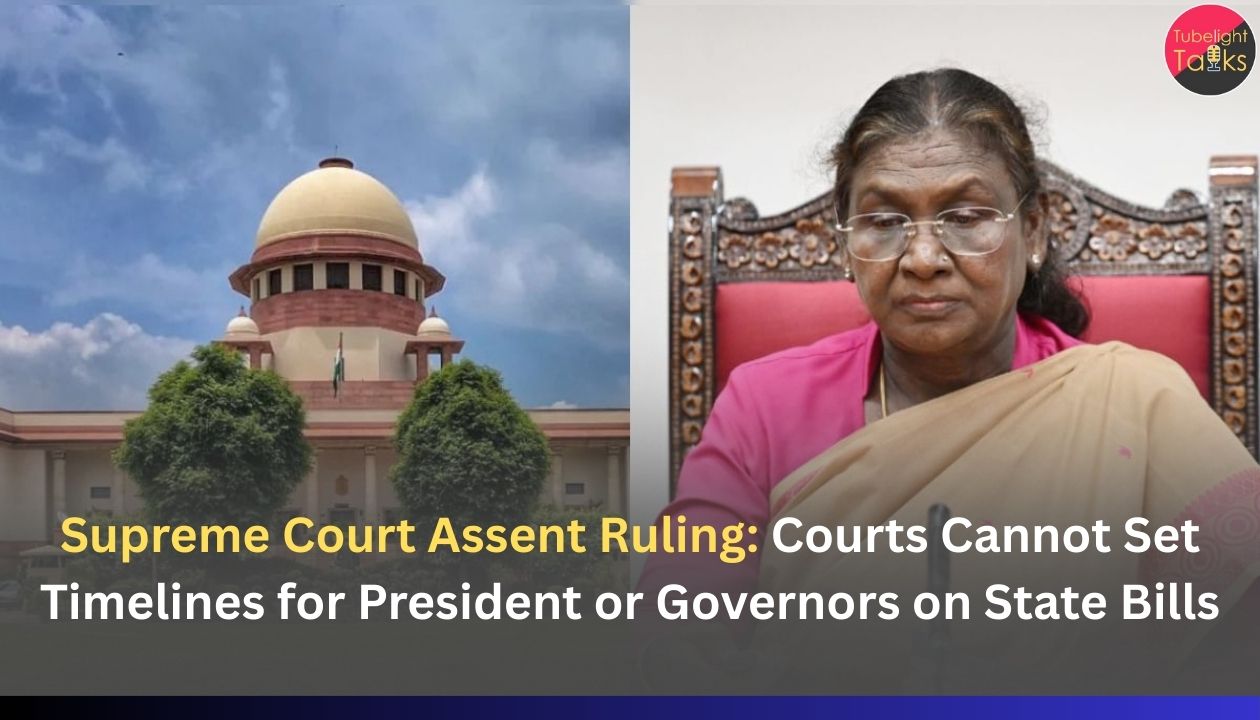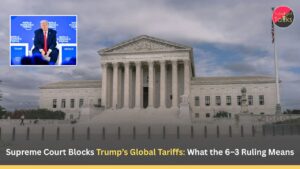Supreme Court Assent Ruling: Courts Cannot Set Timelines for President or Governors on State Bills
Supreme Court Assent Ruling marks a landmark constitutional interpretation as a Bench led by Chief Justice B.R. Gavai held that courts cannot impose fixed timelines on the President or Governors for granting assent to state legislature bills.
The bench addressed 13 questions referred by President Droupadi Murmu under Article 143, clarifying that the authority to assent, withhold, or reserve bills lies constitutionally with these offices and generally remains outside judicial review. However, the Court noted that intervention is possible if unreasonable delays obstruct the legislative process.
Background and Context
The reference came after conflicting rulings on whether constitutional functionaries like Governors and the President must adhere to timelines while deciding on bills passed by state legislatures. The issue gained prominence following a 2025 two-judge bench ruling imposing strict deadlines on Governors and the President for actions on bills.
The President sought the Supreme Court’s advisory opinion under Article 143 to clarify timelines and powers related to Articles 200 and 201 of the Constitution.
Supreme Court’s Key Observations
Constitutional Discretion Without Timelines
The Court held Articles 200 (Governor’s assent to state bills) and 201 (President’s assent when bills are reserved) intentionally allow discretionary power without specific time constraints. Imposing timelines would contradict constitutional design and breach the doctrine of separation of powers by enabling courts to usurp executive roles through “deemed assent” rulings.
Three Constitutional Options for Governors
Under Article 200, the Governor may:
– Grant assent to the bill,
– Withhold assent and return the bill with comments, or
– Reserve the bill for the President’s consideration.
This discretion cannot be judicially reviewed on merits but courts can issue limited directions if there is prolonged, unexplained inaction causing legislative frustration.
Court’s Limited Role
While the Court rejected judicially imposed fixed timelines, it emphasized that Governors and Presidents cannot stall bills indefinitely. If delays are unreasonable, courts can use limited judicial review to direct timely decision-making without commenting on bill merits.
The President’s Role
The President is not constitutionally required to seek review after receiving a reserved bill but may do so based on extraneous considerations. The Court reinforced that the President’s decisions are similarly shielded from routine judicial scrutiny except in instances of excessive delay.
Impact and Reactions
The judgment balances constitutional authorities’ discretion with the need to prevent legislative deadlock, underscoring cooperative federalism. Experts note this preserves the autonomy of Governors and the President while providing safeguards against misuse of power through prolonged inaction.
Ethical Governance
Sant Rampal Ji Maharaj’s Satgyan highlights the importance of righteousness and truth in governance. The Supreme Court’s ruling reflects these principles by respecting constitutional roles while ensuring responsible exercise of power that safeguards democratic processes, embodying Satgyan’s ideals of justice and ethical stewardship.
Key Facts
- The Supreme Court examined 13 questions referred by President Droupadi Murmu under Article 143.
- The Court ruled no fixed timelines can be imposed on Governors or the President to grant assent to state bills.
- Governors have three exclusive options under Article 200: assent, return with comments, or reserve for President.
- Courts can issue limited directions only when there is unreasonable delay causing legislative frustration.
- The decision overturned an earlier April 2025 ruling that had imposed timelines and the concept of “deemed assent.”
Also Read: Indiabulls SC Case: Supreme Court Issues Sharp Rebuke to SEBI and CBI
FAQs: Supreme Court Assent Ruling
1. Can courts set deadlines for Governors or Presidents to assent bills?
No, the Supreme Court ruled timelines cannot be judicially imposed on assent decisions.
2. What options does a Governor have when a state bill is presented?
Assent to the bill, withhold assent and return it with comments, or reserve it for the President’s consideration.
3. Does the President have to act within a timeline on reserved bills?
No binding timeline exists, though undue delay can invite limited court intervention.
4. Can courts review the merits of a Governor’s or President’s assent decision?
No, only delays can be reviewed, not the merits or wisdom of their decisions.
5. What happens if a Governor delays assent indefinitely?
Courts may intervene with limited directions to ensure timely decision-making.
Federalism and Governance Aligns with Constitutional Values
The Supreme Court’s advisory opinion reaffirms the constitutional principle that the President and Governors have discretionary, non-justiciable powers to grant assent to state legislature bills without imposed judicial timelines. This ruling preserves the balance of power and respects the autonomy of constitutional functionaries while ensuring they fulfill their duties within a reasonable time to uphold democratic governance.
The decision marks a crucial interpretation of Articles 200 and 201, emphasizing cooperative federalism and ethical governance aligned with constitutional values.











Discussion (0)